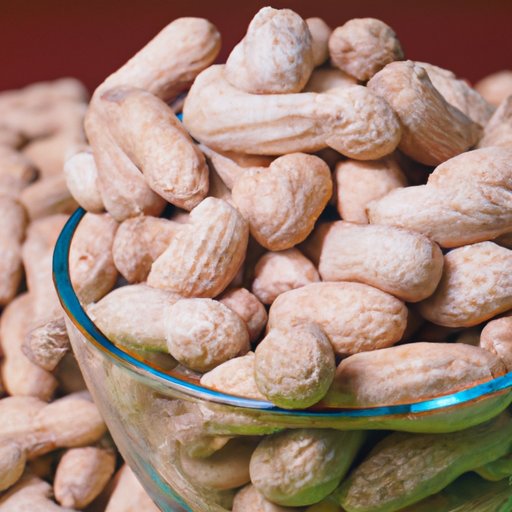
Introduction
Raw peanuts are a snack that is enjoyed by many people but there is some uncertainty regarding whether it is safe to consume them. The purpose of this article is to provide information and guidance on this topic to better inform the audience.
The Benefits and Risks of Eating Raw Peanuts: What You Need to Know
There are many benefits to eating peanuts, both raw and roasted. Peanuts contain a lot of protein, fiber, and healthy fats which makes them a great snack for those who are health-conscious. Additionally, they are very tasty and are used in many different recipes.
However, raw peanuts can also pose a risk of contamination which can lead to health problems. Raw peanuts in particular are prone to contamination from a substance called aflatoxins, which are produced by a fungus that can grow on peanuts. Additionally, raw peanuts can also be contaminated with bacteria such as Salmonella which can cause food poisoning.
Going Raw: Exploring the Nutritional Value of Raw Peanuts
Raw peanuts are uncooked peanuts that have not been roasted or salted. They still have their natural flavor and crunch.
Raw peanuts have some significant nutritional advantages that make them worth considering. Raw peanuts are loaded with essential nutrients such as thiamin, niacin, folate, vitamin E, magnesium, and phosphorus. People who consume raw peanuts on a regular basis are known to have healthier hearts, better metabolism, and better brain function.
However, raw peanuts can also cause some side effects if consumed in large quantities. Raw peanuts may be high in calories, which can cause weight gain if not balanced with a healthy diet and exercise. Additionally, raw peanuts may be difficult for some people to digest, which can cause gastrointestinal distress.
To Eat or Not to Eat: Debunking the Myths of Raw Peanut Consumption
There are many myths surrounding the consumption of raw peanuts. One of the most common is that raw peanuts are poisonous. This is not true, but raw peanuts can contain aflatoxins which can be harmful if ingested in large quantities. Another myth is that eating raw peanuts can cause peanut allergies. This is also not true, but it is important to note that some people may be allergic to peanuts regardless of whether they are raw or roasted.
After careful consideration of the risks and benefits, it is generally safe to consume raw peanuts in moderation. The risks of contamination can be mitigated by properly sourcing and storing peanuts.
Raw Peanuts: Safe or Hazardous? A Comprehensive Guide
Peanuts are generally safe to consume when they have been properly sourced and stored. To avoid exposure to aflatoxins, choose peanuts that are fresh and have been stored in a cool, dry place. Additionally, avoid peanuts that appear to have mold or other signs of contamination.
Common risks associated with peanut consumption include aflatoxin contamination, bacterial contamination, and allergic reactions. To minimize these risks, always wash your hands before handling peanuts, refrigerate peanuts after opening, and be mindful of potential allergic reactions.
If you suspect that you have consumed contaminated peanuts or are experiencing symptoms of food poisoning, seek medical attention right away.
Raw Peanut Eating 101: Tips, Tricks, and Precautions for Safe Consumption
If you choose to consume raw peanuts, there are some precautions you can take to minimize the risk of contamination. Here are some tips:
- Wash your hands before handling peanuts
- Choose peanuts that are fresh and have been stored in a cool, dry place
- Avoid peanuts that appear to have mold or other signs of contamination
- Refrigerate peanuts after opening
- Be mindful of potential allergic reactions
In addition to these precautions, there are best practices for preserving and storing peanuts. Peanuts should be stored in an airtight container in a cool, dry place. This will help prevent moisture and contamination.
Finally, if you’re looking for ways to enjoy raw peanuts, try adding them to your favorite salad or trail mix. You can also roast them in the oven with a sprinkle of salt for a healthy, protein-packed snack.
Conclusion
In conclusion, raw peanuts can be a nutritious and tasty addition to your diet when consumed in moderation and with proper precautions. While there is a risk of contamination from aflatoxins and bacteria, these risks can be minimized by proper sourcing and storage. Keep in mind the benefits and risks of consuming raw peanuts and choose accordingly.
Always wash your hands before handling peanuts, store them in an airtight container in a cool, dry place, and be mindful of potential allergic reactions.




